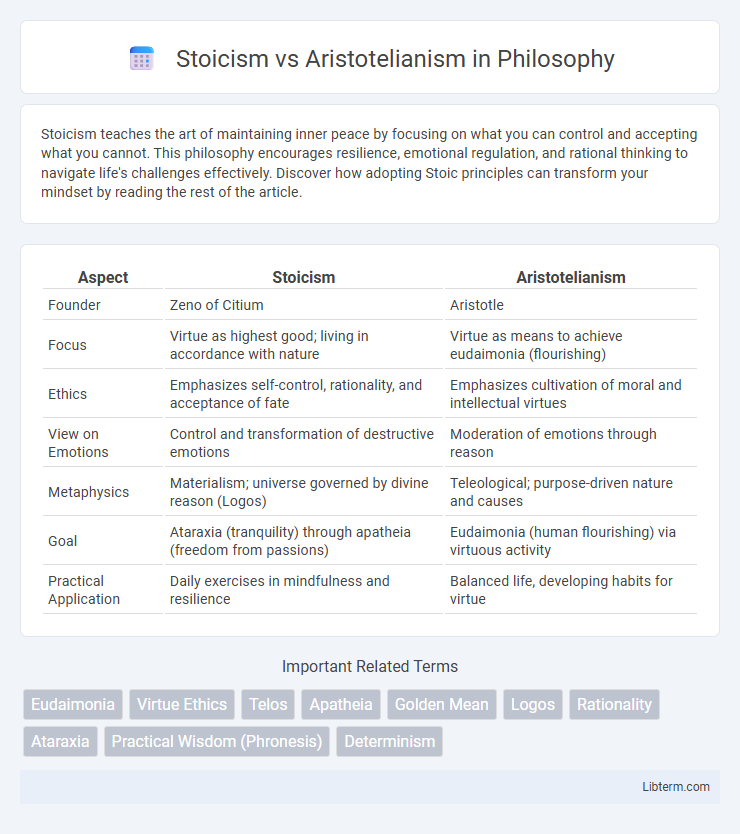Stoicism teaches the art of maintaining inner peace by focusing on what you can control and accepting what you cannot. This philosophy encourages resilience, emotional regulation, and rational thinking to navigate life's challenges effectively. Discover how adopting Stoic principles can transform your mindset by reading the rest of the article.
Table of Comparison
| Aspect | Stoicism | Aristotelianism |
|---|---|---|
| Founder | Zeno of Citium | Aristotle |
| Focus | Virtue as highest good; living in accordance with nature | Virtue as means to achieve eudaimonia (flourishing) |
| Ethics | Emphasizes self-control, rationality, and acceptance of fate | Emphasizes cultivation of moral and intellectual virtues |
| View on Emotions | Control and transformation of destructive emotions | Moderation of emotions through reason |
| Metaphysics | Materialism; universe governed by divine reason (Logos) | Teleological; purpose-driven nature and causes |
| Goal | Ataraxia (tranquility) through apatheia (freedom from passions) | Eudaimonia (human flourishing) via virtuous activity |
| Practical Application | Daily exercises in mindfulness and resilience | Balanced life, developing habits for virtue |
Introduction to Stoicism and Aristotelianism
Stoicism, founded by Zeno of Citium, emphasizes virtue as the sole good and advocates for living in accordance with nature and reason to achieve inner tranquility. Aristotelianism, based on Aristotle's teachings, centers on achieving eudaimonia through the cultivation of virtues and the fulfillment of one's potential in a balanced life. Both philosophies prioritize ethical living but differ in their views on emotions and the role of external goods.
Historical Background and Key Figures
Stoicism, founded in the early 3rd century BCE by Zeno of Citium in Athens, emphasized virtue, reason, and living in harmony with nature, with key figures including Seneca, Epictetus, and Marcus Aurelius. Aristotelianism, based on Aristotle's teachings from the 4th century BCE, focused on empirical observation, logic, and the pursuit of the "golden mean" for ethical behavior, profoundly influencing medieval scholasticism through figures like Thomas Aquinas. Both philosophies shaped Western thought, with Stoicism fostering resilience and self-control, while Aristotelianism provided systematic frameworks for ethics, metaphysics, and natural sciences.
Core Principles of Stoicism
Stoicism centers on cultivating virtue through living in accordance with nature, emphasizing self-control, rationality, and acceptance of fate to achieve tranquility. Its core principles include practicing wisdom, courage, justice, and temperance as cardinal virtues, while maintaining emotional resilience by distinguishing between what is within one's control and what is not. Stoicism contrasts with Aristotelianism, which focuses more on achieving eudaimonia through fulfilling one's function and developing moral and intellectual virtues in a balanced life.
Central Tenets of Aristotelianism
Aristotelianism centers on the concept of virtue ethics, emphasizing the development of moral character through the cultivation of virtues such as courage, temperance, and wisdom to achieve eudaimonia, or human flourishing. It advocates for the "Golden Mean," a balanced approach to behavior between excess and deficiency, tailored to individual circumstances. Unlike Stoicism's focus on emotional control and acceptance of fate, Aristotelianism prioritizes rational activity in accordance with nature as the path to achieving the highest good.
Virtue: Contrasting Stoic and Aristotelian Perspectives
Stoic philosophy defines virtue as living in accordance with nature and reason, emphasizing internal control over emotions and indifference to external goods. Aristotelian virtue centers on achieving eudaimonia through the practical development of character traits via the "golden mean," balancing between excess and deficiency in actions and emotions. While Stoicism prioritizes constancy and self-mastery as the sole path to virtue, Aristotelianism integrates social and contextual factors, promoting moral virtues cultivated over time through experience and deliberate choice.
Approaches to Happiness and the Good Life
Stoicism emphasizes achieving happiness through virtue and living in accordance with nature, advocating for inner tranquility by controlling desires and responses to external events. Aristotelianism defines the good life as eudaimonia, attained by fulfilling one's rational capacities and practicing moral virtues, balancing intellectual and ethical development. Both philosophies value virtue, but Stoicism prioritizes emotional resilience while Aristotelianism highlights practical wisdom and flourishing within a community.
The Role of Reason and Emotion
Stoicism emphasizes reason as the supreme guide for living a virtuous life, advocating for the control and rejection of destructive emotions to maintain inner tranquility. Aristotelianism asserts that reason governs emotions by cultivating virtues through practical wisdom (phronesis), allowing emotions to be harmonized rather than suppressed. Both philosophies value rationality but differ in their approach: Stoicism promotes emotional detachment, whereas Aristotelianism encourages balanced emotional engagement for ethical behavior.
Ethics in Practice: Daily Life Applications
Stoicism emphasizes virtue as living in harmony with nature and practicing self-control, encouraging individuals to accept external events beyond their control while focusing on internal moral character. Aristotelianism centers on achieving eudaimonia through cultivating virtues and practical wisdom, promoting balanced actions aligned with reason in pursuit of a flourishing life. Daily practices in Stoicism involve mindfulness and resilience, while Aristotelian ethics guide decision-making through habituation and moral deliberation to attain ethical excellence.
Influence on Modern Thought and Psychology
Stoicism's emphasis on emotional resilience and rational control heavily influenced cognitive-behavioral therapy (CBT), shaping modern psychology's approach to managing thoughts and emotions. Aristotelianism, with its focus on virtue ethics and the cultivation of character through habituation, underpins contemporary moral psychology and educational practices. Both philosophies contribute foundational concepts to modern thought, particularly in areas concerning personal development, ethical decision-making, and mental well-being.
Conclusion: Lasting Legacies and Contemporary Relevance
Stoicism's lasting legacy lies in its emphasis on inner resilience and virtue as a means to achieve tranquility, resonating strongly with modern psychological practices like cognitive-behavioral therapy. Aristotelianism contributes enduring insights into ethics and metaphysics, highlighting the pursuit of eudaimonia through rational activity and the cultivation of virtues. Both philosophies continue to influence contemporary discussions on moral character, personal development, and the nature of human flourishing.
Stoicism Infographic

 libterm.com
libterm.com